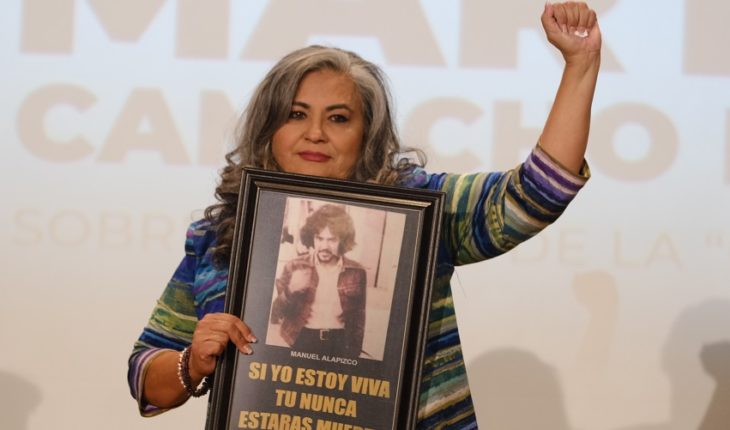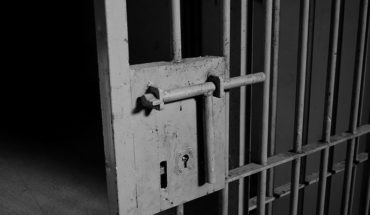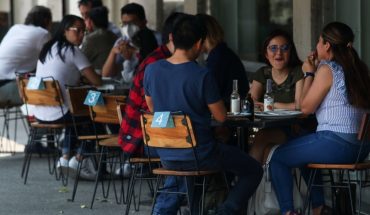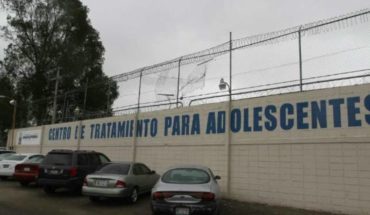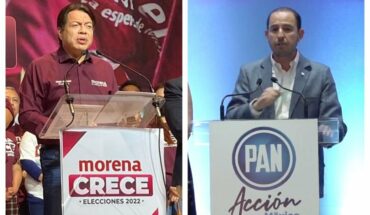“Mrs. Martha Alicia Camacho Loaiza. Mr. Miguel Alfonso Millán. On behalf of the Mexican State, I offer you a public apology for the transgression of your rights in the context of serious, widespread and systematic human rights violations that occurred in a context of political violence in the past in the period known as Dirty War. You, Mrs. Martha Alicia Camacho, were arbitrarily detained, tortured and transiently disappeared. Mr. Miguel Alfonso Millán was tortured and disappeared on a transient basis. Mr. José Manuel Alzapico Lizarraga was arbitrarily, tortured and extrajudicially deprived.”
With these words, the Secretary of the Governorate, Olga Sánchez Cordero, made the request for forgiveness from the Mexican state to Martha Alicia Camacho Loaiza, her son Miguel Alfonso and husband José Manuel Alzapico. This is the first time mexico has apologized to a victim of the repression that occurred during the time known as the Dirty War, which took place in the 1960s and 1970s.
Camacho Loaiza and her husband José Manuel Alzapico were arrested in Culiacán, Sinaloa, on August 19, 1977. She was pregnant and gave birth during captivity. He was killed and his wife had to witness the tortures to which he was subjected and his execution. The woman survived because her father paid a ransom. Your husband’s body never showed up.
Both were members of the Communist League 23 September, a military political group that operated in Mexico between the 1970s and early 1980s. Dozens of these activists were arrested, tortured and disappeared.
The account of what happened to him is shocking. She explained it herself through a video designed by the Miguel Agustín Pro Juárez Center for Human Rights. How the military castrated her husband in front of him. How they threw him on his bloodied body. How he had to witness his agony and death. How she gave birth to her son in captivity and, as soon as she was born, they put a Thompson machine gun on her, making jokes that “a guerrilla was born.”
“They were made by the judicial police of the State of Sinaloa, the Directorate General of Security and the Mexican Army. I offer you an apology for the denial of your access to justice and to recognize the truth about the facts, as well as the whereabouts of the body of Mr. José Manuel Alzapico. Faced with the obstacles and delay of the institutions responsible for imparting justice. I offer you a public apology for the damage to the image, honor and dignity in grievance of your family, derived from the criminalization carried out against you by various institutions of the Mexican state,” said Sánchez Cordero.
“The Mexican State makes a commitment to ensure full redress of damage caused by the authorities since August 19, 1977. I reiterate the commitment to implement measures for the non-repetition of acts that violated their human rights. No one else has to go through these atrocities,” the Secretary of the Governorate said.
The act of redress took place at the University Center of Tlatelolco. On the part of the State, the Secretary of the Governorate, Olga Sánchez Camacho, and the Undersecretary for Human Rights, Migration and Population, Alejandro Encinas, took the floor. Among the public, former Communist League militants September 23 and relatives of missing persons.
“Healing the country requires truth, justice, and memory. As long as cases of the past are not resolved, as long as there are no examples of justice, these serious violations will continue to occur. If this government wants to change, it has to start bringing justice to the cases of yesterday and today. This is the possibility that regime change will become a real process of democratic transition,” Camacho Loaiza said during his speech.
“This is a light, a hope, a starting point. Don’t let this be alone in an apology. It’s a first achievement. We must move on,” said the survivor, who came to the event with a portrait of her murdered husband in which it could be read “if I am alive you will never be dead.”
“Now the state recognizes its responsibility. With more desire, with more strength, I will continue to ask for justice,” the woman said. She is the first victim of the so-called “dirty war” to receive the request for apologies from the state. However, she is reluctant to use the term “dirty war” and considers “state crimes” more appropriate.
“I’m so sorry the Silk isn’t there. He missed a great opportunity to recognize the atrocities they committed at the time. Recognizing it would be very healthy towards strengthening that institution. They should be here, because it went precisely inside the IX Military Zone of Culiacan, Sinaloa, where atrocities were committed that go beyond human understanding,” he said.
Political Animal asked the Sedena about these statements, but at the close of the note he had received no response.
“Seeking justice has not been easy,” said Camacho Loaiza, who lamented that there were institutions that “didn’t live up to it.”
It appreciated the recommendation of the 2001 National Commission on Human Rights (CNDH), which recognized the existence of irregular stoppage, torture and disappearances. “It was a first impulse,” he said.
Excited, she thanked her family and fellow searchers for their support and urged the State to bring such acts to other territories such as Sinaloa. “This country is a pit. The state must turn to our faces so as not to go on alone. We must move forward,” he said.
Camacho Loaiza’s intervention was preceded by two official voices. On the one hand, the secretary of the Governorate, Olga Sánchez Cordero. On the other hand, Alejandro Encimas, undersecretary of human rights, migration and population and who was also a member of the Communist Party.
“This is an act of great significance. It is the recognition of the responsibility of the Mexican State in serious violations of human rights. A stop along the way in a story where we haven’t been able to create the meeting conditions of our country,” Encinas said.
The undersecretary valued the recognition “amid the juncture of debate about one of the darkest episodes in our country’s life, the Dirty War. It must force us to oversee, rewrite our own history, and take on our responsibilities.”
“The principle of authority and the reason of state prevailed over the rights and freedoms of individuals. The State has an obligation to prosecute those who committed wrongdoing, but this must always be done in the context of respect for the rights of all persons and not in the context of disappearance or torture,” he said.
Encinas also recognized the existence of “a persecuted generation.” A generation to which Camacho Loaiza belongs. For example, the 2001 CNDH report acknowledges the existence of 532 missing between the 70s and 80s. The Prosecutor’s Office specializing in Social and Political Movements of the Past, created during the term of Vicente Fox (2000-2006) also recognized the existence of more than 2,000 tortured and missing persons.
“Mexico of the 70s lived in repression, the state assumed as enemies political dissidents. Counterinsurgency practices, detensions, torture, hundreds of men and women were conducted,” Encinas said.
The undersecretary said that the government of Andrés Manuel López Obrador “is a change in the face of impunity, which must be left behind.” He not only defended himself from asking for forgiveness, but to seek out those responsible and commit to a culture of defense of freedoms.
“Our sincerest apology. We’re going to keep working for the freedom of all Mexicans,” he said.
What we do in Animal Político requires professional journalists, teamwork, dialogue with readers and something very important: independence. You can help us keep going. Be part of the team.
Subscribe to Animal Politician, receive benefits and support free journalism.#YoSoyAnimal
translated from Spanish: Martha Camacho, victim of Dirty Warfare
September 24, 2019 |
